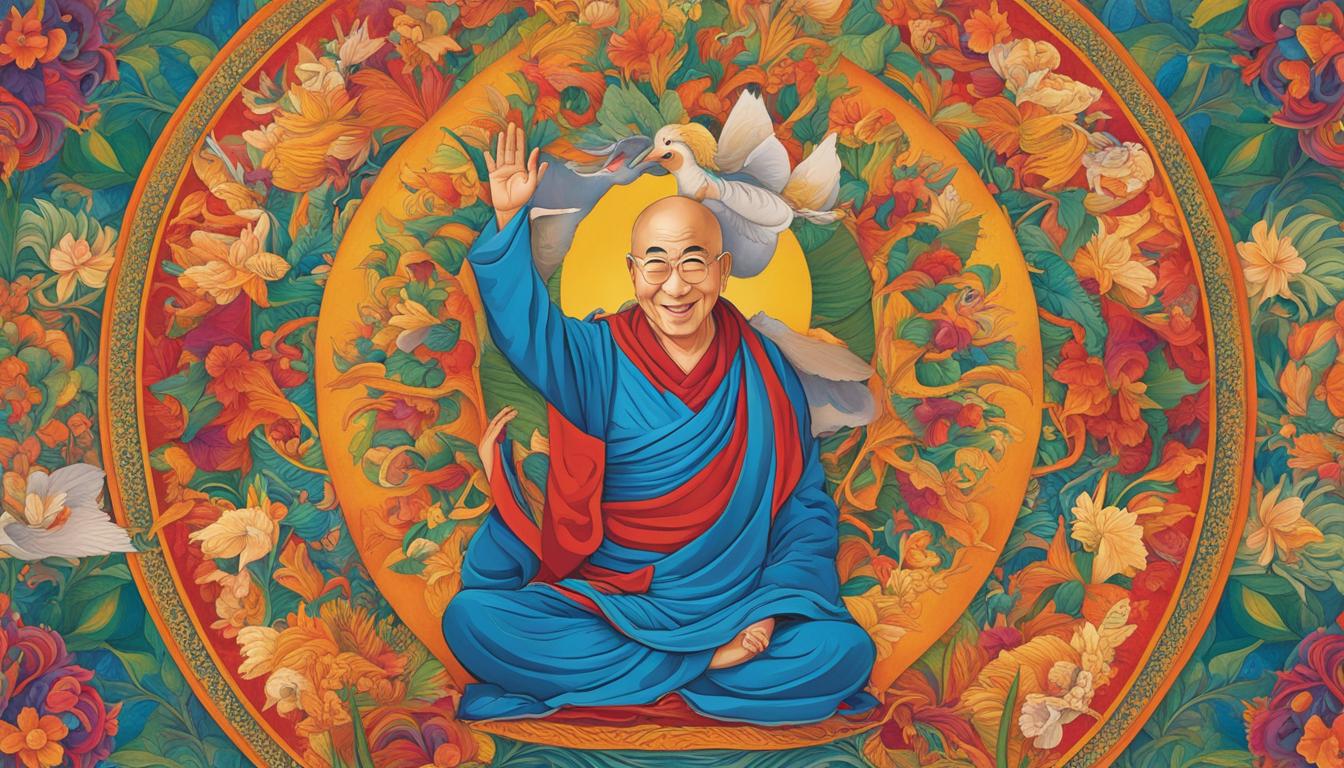Looking to enhance your life with profound wisdom and insights? Then you don’t want to miss our The Art of Happiness audiobook review, exploring the remarkable teachings of Dalai Lama. This highly acclaimed audiobook combines the spiritual leader’s teachings with the insights of famed psychologist Howard C. Cutler. Together, their collaboration offers a life-affirming perspective, guiding listeners towards greater happiness and inner peace.
Introduction to “The Art of Happiness”
“The Art of Happiness” audiobook is a remarkable collaboration between the Dalai Lama, one of the world’s spiritual leaders, and Howard C. Cutler, a renowned psychiatrist. The book aims to provide practical and transformative insights into the attainment of inner happiness in our daily lives, drawing from the Dalai Lama’s teachings and Cutler’s clinical observations.
The Dalai Lama’s teachings on happiness and living a meaningful life are rooted in Tibetan Buddhism, in particular the profound concepts of compassion, non-violence, and altruism. Through his unparalleled spiritual journey and extensive study of Buddhist philosophy, the Dalai Lama has gained deep insights into the nature of happiness and the path towards inner peace and well-being.
By combining these insights with Cutler’s medical expertise, “The Art of Happiness” provides a compelling and unique approach to mental and spiritual well-being, with practical and accessible guidance to help individuals enhance their lives.
Whether you are seeking greater happiness, meaning, or personal fulfillment, “The Art of Happiness” audiobook offers life-changing wisdom that can shape your perspective and transform your journey.
The Dalai Lama’s Spiritual Journey
The Dalai Lama, whose given name is Tenzin Gyatso, was born in 1935 in Tibet and recognized at age two as the 14th reincarnation of the Dalai Lama. His spiritual journey began at an early age, when he was identified as the leader of the Gelug school of Tibetan Buddhism, one of the major schools in Tibetan Buddhism. Throughout his life, he has engaged in extensive study and contemplation of Buddhist philosophy, ranging from the basics of Buddhist teachings to the intricacies of tantra and dzogchen, and has worked tirelessly to promote peace, compassion, and interfaith dialogue.
The Dalai Lama’s spiritual journey has been shaped by his experiences living under Chinese occupation, as well as by his interactions with leaders from around the world. Despite facing numerous challenges and setbacks, he has remained steadfast in his commitment to promoting the values of nonviolence, wisdom, and compassion, and has inspired millions around the world with his teachings.
Buddhist Philosophy
The Dalai Lama is widely respected for his deep knowledge of Buddhist philosophy, which underpins much of his teachings on happiness and inner peace. Central to Buddhist philosophy is the concept of suffering, which is viewed not merely as a physical or mental experience, but as a fundamental aspect of existence. In order to overcome suffering, it is necessary to gain an understanding of its causes and roots, which include the three poisons of ignorance, attachment, and aversion.
The Dalai Lama’s teachings on Buddhist philosophy emphasize the importance of cultivating positive qualities such as love, compassion, and wisdom, while working to overcome negative emotions and habitual patterns of thought. Through the practice of meditation, mindfulness, and other spiritual disciplines, individuals can develop greater inner awareness and find a more profound sense of happiness and well-being.
Exploring the Concept of Happiness
According to the Dalai Lama, happiness is a fundamental human aspiration that can be achieved through various means. However, true happiness extends beyond instant gratification and material possessions. The pursuit of happiness entails cultivating inner peace, well-being, and mental health.
The Dalai Lama’s teachings emphasize the importance of mindfulness, compassion, and gratitude in nurturing our well-being. By being present in the moment, valuing our relationships, and finding a sense of purpose and meaning in life, we can shift our focus from external validation to inner fulfillment.
In a society that often glorifies busyness and material success, the Dalai Lama’s insights on happiness offer a refreshing perspective. By prioritizing our mental health and relationships, we can lead more fulfilling lives and contribute to the well-being of those around us.
The Role of Inner Peace
The Dalai Lama believes that inner peace is essential for achieving lasting happiness. By creating a sense of calm within ourselves, we can cultivate a positive mindset and reduce stress and anxiety. Mindfulness meditation is a powerful tool for developing inner peace and promoting stress resilience.
Well-being and Mental Health
Well-being encompasses physical, mental, and emotional health. Taking care of our bodies through healthy habits such as exercise, sleep, and a balanced diet is crucial. However, mental health is equally important. The Dalai Lama emphasizes the need for self-reflection and addressing negative thought patterns to promote positive mental health.
Cultivating Happiness
For the Dalai Lama, happiness is not a destination but a journey. It requires intentional effort and the cultivation of virtuous qualities such as kindness, compassion, and forgiveness. By prioritizing personal growth and contributing to the well-being of others, we can attain a sense of fulfillment and happiness.
Understanding the Four Noble Truths
The Four Noble Truths are at the heart of Buddhist philosophy, representing the foundation of the Buddha’s teachings. According to the Dalai Lama, these truths are essential for understanding the nature of suffering and how to achieve liberation from it.
The first Noble Truth is the recognition of the reality of suffering, which is an inherent part of human existence. The second Truth highlights the root of suffering, which is craving and attachment. The third Truth offers the hope of liberation from suffering by letting go of attachment and craving. Finally, the fourth Truth outlines the path towards liberation, known as the Eightfold Path.
By understanding and embracing the Four Noble Truths, we can gain insight into the nature of suffering and the path towards liberation and happiness. It is important to note that the concept of suffering in Buddhism includes not only physical and emotional pain but also the unsatisfactory or fleeting nature of all phenomena.
The Four Noble Truths Explained:
| Noble Truth | Explanation |
|---|---|
| The reality of suffering | All experiences are marked by suffering, including birth, aging, illness, and death. |
| The root of suffering | The root of suffering is craving and attachment, which leads to unsatisfactoriness and dissatisfaction. |
| The hope of liberation | Liberation from suffering is possible by letting go of craving and attachment. |
| The path towards liberation | The Eightfold Path offers a framework for achieving liberation and happiness. |
The Four Noble Truths are not easy concepts to grasp fully, but by understanding their profound teachings, we can gain insight into the nature of suffering and the path towards liberation and happiness.
Cultivating Mindfulness and Compassion
Practicing mindfulness and compassion is essential to cultivate happiness and develop a more meaningful connection with oneself and others. The Dalai Lama emphasizes the importance of incorporating mindfulness practices in everyday life to cultivate positive emotions and reduce the impact of negative ones.
Mindfulness is the act of being present in the moment and paying attention to one’s thoughts and feelings without judgment. The practice of mindfulness helps individuals become more self-aware and develop a greater sense of empathy and compassion towards others.
Compassion is the practice of being kind, caring, and understanding towards oneself and others. Compassionate individuals recognize and acknowledge the suffering and pain of others, and are willing to lend a helping hand without judgment or expectation of reward.
Meditation is a powerful tool to cultivate mindfulness and compassion. It helps individuals develop a sense of inner peace and calmness, and reduces stress and anxiety. Regular meditation practice can help individuals develop emotional resilience and cultivate a more positive mindset.
By incorporating mindfulness and compassion practices into our daily lives, we can foster deeper connections, improve our well-being, and lead a more fulfilling life.
Overcoming Negative Emotions and Cultivating Positive Ones
The Dalai Lama emphasizes the importance of emotional resilience and well-being, which rely on overcoming negative emotions such as anger, jealousy, and hatred, while fostering positive ones like love, compassion, and forgiveness. By acknowledging and accepting negative emotions, we can develop the inner strength to overcome them and prevent them from controlling our thoughts and actions.
One practical approach is to develop mindfulness, which involves being present and aware of our thoughts, feelings, and physical sensations without judgment. This can help us observe negative emotions without being consumed by them, and gradually develop a greater sense of emotional balance and stability. Similarly, cultivating compassion towards ourselves and others can help us build stronger and more fulfilling relationships, reduce stress and negative emotions, and promote mental and physical well-being.
Remember, emotional resilience is not just about avoiding negative emotions, but also about cultivating positive ones. By focusing on positive emotions and thoughts, we can gradually shift our perspective towards greater happiness and well-being.
Finding Purpose and Meaning in Life
According to the Dalai Lama’s teachings, finding purpose and meaning in life is essential for personal fulfillment and lasting happiness. When we align our actions with a greater sense of purpose, we experience a sense of direction and clarity in our lives.
Contributing to the well-being of others is also a crucial aspect of finding purpose and meaning in life. By helping others, we create a connection with the world beyond ourselves and feel a sense of accomplishment and satisfaction.
When we find purpose and meaning in life, we are more resilient in the face of challenges and setbacks. We have a greater sense of inner strength and motivation to overcome obstacles and pursue our goals.
Discovering Your Purpose
Finding purpose and meaning in life is a deeply personal journey that requires reflection, self-awareness, and exploration. The following are some strategies that can help:
- Reflect on your values and what matters most to you
- Identify your strengths and interests
- Explore different opportunities, experiences, and activities
- Seek guidance and support from mentors, counselors, or trusted friends
The Importance of a Purposeful Life
Living a purposeful life not only brings about personal fulfillment, but it also benefits society as a whole. When individuals find purpose and meaning in their lives, they are more likely to contribute positively to their communities and create a ripple effect of positive change.
Furthermore, a purposeful life can enhance our overall sense of well-being, improve our mental health, and even increase our lifespan. By aligning our actions with a greater sense of purpose, we create a life that is rich in meaning and deeply fulfilling.
Balancing Material Progress and Spiritual Values
In today’s world, many individuals and societies prioritize material progress over spiritual values. The Dalai Lama, however, emphasizes the importance of striking a balance between the two for long-term happiness and societal well-being. While material progress can provide certain comforts and conveniences, it alone does not guarantee true happiness.
In contrast, spiritual values and practices, such as mindfulness, compassion, and gratitude, have been found to enhance well-being and foster deeper connections with oneself and others. By prioritizing these values and integrating them into daily life, individuals can achieve a more profound sense of personal fulfillment.
Moreover, excessive focus on material wealth can lead to a neglect of societal well-being, which ultimately affects the happiness and stability of an entire community. Therefore, the Dalai Lama encourages individuals and societies to prioritize the greater good, taking into account the needs and well-being of all members of society rather than the pursuit of personal gain alone.
Nurturing Relationships and Connection
The Dalai Lama’s teachings emphasize the importance of nurturing meaningful relationships and fostering deeper connections with others as a vital aspect of achieving lasting happiness. Relationships provide a sense of belonging and social support that can enhance overall well-being.
Empathy, understanding, and respect for others are central to creating harmonious interactions. By striving to maintain interpersonal harmony, individuals can foster richer and more rewarding relationships. Taking the time to listen deeply, communicate authentically, and share experiences with others can help build stronger connections and provide a sense of purpose and fulfillment.
In a society where digital communication is prevalent, face-to-face interactions hold even greater value. Research has shown that nurturing positive relationships can lead to healthier lifestyles, decreased likelihood of mental health challenges, and even enhanced longevity.

Thus, it is critical to invest time and energy in cultivating and maintaining meaningful relationships. By building a support network of individuals with shared values and interests, individuals can more effectively navigate life’s challenges and celebrate its joys.
Applying Wisdom in Everyday Life
Reading The Art of Happiness audiobook is just the beginning of the journey towards lasting happiness and personal fulfillment. To truly benefit from the Dalai Lama’s teachings, it’s essential to apply his wisdom to our daily lives. Here are some practical ways to incorporate his teachings into your everyday routine:
- Cultivate mindfulness in everything you do, whether it’s washing dishes, walking or working.
- Practice gratitude and appreciation for the little things in life.
- Be kind and compassionate to yourself and others.
- Find purpose and meaning in your actions, and align them with your values.
- Embrace impermanence as a natural part of life and be adaptable to change.
By applying these practical wisdoms to our daily lives, we can cultivate a positive mindset and enhance our overall well-being. Remember, happiness is not a destination; it’s a journey.
Embracing Change and Impermanence
The concept of change and impermanence is central to Buddhist philosophy and a recurring theme of “The Art of Happiness.” Through the Dalai Lama’s teachings, we learn that change is an essential part of life and that accepting it is crucial to achieving happiness and inner peace. By cultivating acceptance, adaptability and a deeper understanding of impermanence, we can foster resilience, letting go of fear and anxiety caused by the uncertainties of life.
Adaptability enables us to navigate through changes, explore new possibilities and open ourselves up to new experiences, leading us to new horizons and opportunities. By accepting change and its impermanence, we can transform challenges and hardships into opportunities for growth, learning, and renewal. As the Dalai Lama reminds us, “The ultimate source of happiness is within us; our problems and challenges are our sources of growth.”
Therefore, rather than resisting change, try embracing it as a natural part of your journey, and the tools taught by the Dalai Lama can help you navigate through life’s ups and downs. With a deeper understanding of impermanence and the principles that underpin it, you can live life more fully with a greater appreciation for each moment, ultimately leading to a more fulfilling and contented life.
Gratitude and Contentment
The concept of gratitude and contentment holds a fundamental place in the Dalai Lama’s teachings on happiness. Gratitude is the practice of appreciating the blessings in our lives, both big and small. It involves shifting our focus from what we lack to what we have and cultivating an attitude of thankfulness.
Contentment, on the other hand, is the state of being satisfied with what we have and where we are in life. It involves recognizing that happiness is not dependent on external circumstances, but rather, an internal state of mind.
Embracing gratitude and contentment is essential for cultivating a happiness perspective, helping us focus on the positive aspects of our lives and finding joy in the present moment.

Building a habit of expressing gratitude and finding contentment can have transformative effects on our happiness levels. Research has shown that gratitude practices such as daily journaling or expressing gratitude towards others can boost our well-being and increase feelings of happiness and contentment.
Creating a Mindful Society
According to the Dalai Lama, creating a mindful society requires valuing and nurturing qualities such as compassion, empathy, and kindness. By fostering these attitudes, individuals can work towards contributing to the well-being of society as a whole. A society that is mindful and compassionate can promote societal well-being, leading to a happier and more fulfilling life for everyone.
The concept of a mindful society involves prioritizing the needs of the community and creating an environment that fosters positive social interactions. A society that promotes individual well-being and interpersonal harmony can serve as a buffer against negative influences and foster social and emotional resilience.
The Role of Compassion in Society
Compassion represents the foundation of any mindful society. Encouraging a compassionate attitude towards others can serve as the catalyst for positive change, both at the individual and societal levels. Compassion in society means focusing more on others’ well-being and less on individual needs, creating a strong sense of community and solidarity.
Research has shown that compassion plays a crucial role in enhancing social support, reducing stress, and promoting positive emotions. By developing a compassionate mindset and nurturing social relationships, individuals can contribute to creating a harmonious and mindful society, where empathy and kindness prevail.
Benefits of Compassion in Society
| Benefits of Compassion in Society | Description |
|---|---|
| Enhanced Social Support | Compassionate acts can strengthen social bonds and create a sense of community, providing individuals with a support network. |
| Reduced Stress | Compassion can reduce cortisol levels and lower stress, leading to a healthier and happier life. |
| Promotion of Positive Emotions | Compassion can increase positive emotions such as empathy, kindness, and gratitude, promoting well-being and happiness. |
| Positive Impact on Societal Well-being | A society that encourages compassion and empathy can foster societal well-being, promoting harmony and reducing societal conflict. |
The image above represents the idea of a mindful society, where individuals work towards promoting compassion, empathy, and kindness within their community. By creating an environment that prioritizes the needs of others, we can foster a sense of inclusion and belonging, creating a more mindful and harmonious society.
Personal Reflections on “The Art of Happiness”
Many individuals have discovered the transformative power of “The Art of Happiness” audiobook by Dalai Lama. The profound insights shared in this audiobook have impacted people’s perspectives and enhanced their lives in meaningful ways.
One listener stated, “After listening to ‘The Art of Happiness,’ I gained a deeper understanding of what true happiness means. I started to prioritize my well-being over material success, and it has made all the difference.” Another individual reflected, “The teachings on mindfulness and compassion have helped me cultivate more meaningful relationships and find greater joy in my daily life.”
Listening to this audiobook has had a profound impact on people’s personal and spiritual growth, helping them to navigate life’s challenges and find a greater sense of meaning and purpose.
Conclusion
In conclusion, “The Art of Happiness” by Dalai Lama and Howard C. Cutler offers profound insights into fostering happiness and well-being, rooted in Buddhist philosophy and the Dalai Lama’s personal experiences.
Through exploring concepts such as mindfulness, compassion, gratitude, and meaningful connection, the audiobook provides practical guidance for enhancing our daily lives and cultivating a more fulfilling existence.
Personal reflections on the impact of this audiobook highlight the enduring value of its teachings. Whether seeking to improve one’s own well-being or contribute to the betterment of society at large, “The Art of Happiness” offers a valuable perspective and a roadmap towards greater happiness and fulfillment.
In summary, this audiobook review highlights the wisdom and guidance offered by the Dalai Lama in “The Art of Happiness,” making it a valuable addition to any individual’s personal growth and development journey.



